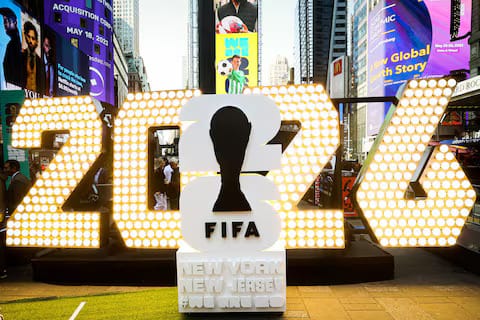The Price of Glory: 2026 FIFA World Cup Ticket Pricing and the Looming Threat of Dynamic Pricing
The 2026 FIFA World Cup ticket sales are live with dynamic pricing. Prices start at $60 for the group stage and rise to $6,730 for the final.

Written by Lavanya, Intern, Allegedly The News
MEXICO CITY, September 11, 2025
The countdown to the 2026 FIFA World Cup has begun, and with it, the frenzy to secure a seat at what will be the largest tournament in history. As fans across the globe register for the initial ticket draw, a new, and for many, controversial, element has entered the equation: dynamic pricing. This unprecedented move by FIFA marks a significant departure from past tournaments, creating a new landscape for fans that will likely see prices fluctuate dramatically based on demand. While FIFA claims this model is simply an adaptation to the North American market, critics argue it's a blatant cash grab that could price out the very fans who make the tournament what it is.
The Official Breakdown: Group Stage vs. Knockout Matches
FIFA has publicly announced a broad range for ticket prices, with the cheapest seats for group-stage matches starting at $60 USD. This is being touted as an "accessible entry point" for fans. The prices for knockout stage matches, as expected, will be significantly higher. The most exclusive seats for the final match are listed at up to $6,730 USD. These figures, however, are merely the starting points. The real story lies in the dynamic pricing model that will be applied from the very first day of ticket sales. This means that a group stage ticket that starts at $60 could, and likely will, climb in price based on real-time demand.
To put this in perspective, the 2022 World Cup in Qatar had prices that started at $69, with the most expensive final tickets reaching $1,607. The stark difference in the top-end price for 2026 highlights the new era of pricing.
A New System for a New World Cup
The implementation of dynamic pricing for the 2026 FIFA World Cup is a landmark decision. While similar models have been used for concerts and other major sporting events, this is the first time it will be applied to the men’s World Cup. FIFA officials, including Chief Operating Officer Heimo Schirgi, have defended the move, stating it's an adaptation to the U.S. and Canadian markets where such practices are common and accepted by consumers. "We're looking at optimizing the revenue, but also optimizing attendance in the stadium," Schirgi said in a press conference.
The new system means ticket prices won't be fixed by a simple category system like in previous years. Instead, prices for matches will fluctuate constantly. This introduces an element of unpredictability for fans, forcing them to purchase tickets early to secure the lowest possible price. However, with the tournament draw not taking place until December 5, 2025, fans in the first phase of the draw are essentially buying blind, hoping their lottery-selected matches will feature their favorite teams or a marquee matchup.
The Ticketing Timeline:
- September 10-19, 2025: Visa Presale Draw. This is the first opportunity for fans to apply for tickets, with successful applicants notified by September 29.
- October 1, 2025 onwards: Successful applicants from the Visa Presale Draw are given a time slot to purchase tickets.
- October 27-31, 2025: Registration for the "Early Ticket Draw" opens.
- Mid-November to early December 2025: Purchase slots for the "Early Ticket Draw" are assigned.
- After December 5, 2025: A "Random Selection Draw" will take place after the official tournament draw, allowing fans to apply for specific matches now that the groups are known.
- Closer to the Tournament: Any remaining tickets will be sold on a first-come, first-served basis.
This phased approach, while designed to manage demand, also gives FIFA ample opportunity to adjust prices upward as demand intensifies. The $60 and $6,730 figures are merely the floor and ceiling for a pricing structure that will be in constant motion.

The Resale Market and the Inequitable Price Floor
A critical component of this new pricing model is the resale platform. FIFA will establish an official resale platform, but with a significant difference for the North American market. In the past, FIFA has capped resale prices at face value to prevent scalping. For the 2026 tournament, however, there will be no cap on resale prices for U.S. and Canadian ticket holders. This policy, confirmed by Heimo Schirgi, opens the door for a secondary market where prices could skyrocket. In contrast, Mexican law requires tickets to be sold at face value, creating a starkly different experience for fans in the three host countries.
This dual system for resale highlights a major point of contention. While FIFA is positioning itself as a consumer-friendly organization by providing an official resale platform, the absence of a price cap in two of the three host nations directly invites the same kind of unchecked speculation that has plagued other major events. The concern is that the cheapest tickets, the $60 ones, will be immediately bought up by resellers and then re-listed for hundreds, if not thousands, of dollars. This not only makes the cheapest tickets unattainable for the average fan but also undermines FIFA’s claim of an "accessible entry point" to the tournament.
The pricing data from the 2022 World Cup in Qatar and the 1994 World Cup in the U.S. provides a stark comparison. In 1994, ticket prices ranged from $25 to $475. In Qatar, the range was $69 to $1,607. The 2026 projections, with a potential high of $6,730, represent a massive leap in cost, driven in large part by the new dynamic pricing model and the removal of resale price caps.
What Happens Next? The Fan's Dilemma
With the first phase of ticket sales underway, fans are caught in a difficult position. The best strategy to secure tickets at the lowest possible price is to enter the draws and purchase as early as possible. However, this requires a significant leap of faith, as the specific teams and matchups won't be known for months. A fan could secure a ticket for a match in a specific city only to find out it’s for a less-than-thrilling game.
The expanded 48-team format and 104-game schedule will inevitably create a vast range of demand for different matches. A group stage match featuring two lower-ranked teams may indeed see its price remain close to the $60 floor, or even drop if demand is low. However, a highly anticipated group stage match—say, a rivalry game or one involving a perennial powerhouse like Brazil or Argentina—will almost certainly see its price surge, possibly into the hundreds of dollars, even in the initial sale phases.
For fans of the host nations, there is an added layer of complexity. The “Follow My Team” packages will be popular, but their value is entirely dependent on how far the team advances. The "Conditional Supporter Tickets" allow fans to reserve a place in potential knockout rounds, but these, too, come with a financial commitment before the outcome is known.
Ultimately, the new pricing system places the financial risk squarely on the fan. The ability to attend a World Cup match, once a dream for many, is increasingly becoming a luxury accessible only to those with significant disposable income or the willingness to take a chance on a lottery system that is far from a guarantee.
What do you think?
How will the absence of a resale price cap in the U.S. and Canada impact the affordability and accessibility of the 2026 World Cup for local fans? Do you believe the use of dynamic pricing for the World Cup is a fair adaptation to modern market trends, or a betrayal of football's working-class roots? Given the sheer number of matches (104) and venues (16), what strategies can fans employ to maximize their chances of securing tickets for desirable matches without overpaying?
Sources
FIFA, The Guardian, CTV News Toronto, Afar Magazine, Reddit, The Times of India, NJ Spotlight News, TPR.




